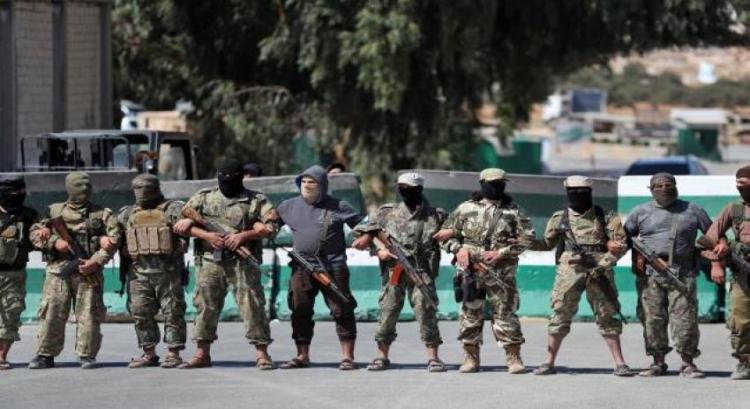IDLIB, Syria (North Press) -Tension continues between Hayat Tahrir al-Sham (HTS, formerly al-Nusra front) and the Fathbatu (Holdout) Operations room in Idlib, northwestern Syria, especially after their recent agreement to a ceasefire mediated by the Turkestan armed group.
A source close to HTS, identified as Ayman al-Idlibi for security reasons, told North Press that “al-Julani, the leader of HTS, is worried about Fathbatu Operations Room, especially Abu Malik al-Tali, who believes that he is the one who has the right to lead HTS because of his old jihadist history with al-Qaeda.”
Economic dispute
He pointed out that "an economic dispute is being clarified between al-Julani and al-Tali, especially when al-Tali began investing his money in projects outside HTS.”
In 2013, when al-Tali was the Emir of al-Nusra Front (Jabhat al-Nusra), he received millions of dollars for the release of the Maaloula nuns who were kidnapped in Qalamoun in the Damascus countryside.
“After the return of al-Tali to Idlib, he started investing money outside the authority, which makes him able to attract a large number of leaders and elements,” the source said.
Then the conflicts between al-Julani and al-Tali began to develop, this led to the arrest of al-Tali about a week ago, and all of this was explained as a struggle to lead the jihadi scene in the region.
Sources believe that al-Tali did not hand over the dollars he had received for the nuns to al-Julani, but preferred to invest them, and that was when he chose to defect from al-Nusra and resort to the jihadist groups affiliated with al-Qaeda. This was unbearable to al-Julani, who was always proud of his powerful group which rivalled the regime.
The source said that “al-Tali invests his money in restaurants, exchange companies, transfers money and trades on a wide level. Moreover, al-Julani's greed for al-Tali’s money stems from the former’s intention to weaken the latter and make him unable to compete for the leadership of any group.”
Al-Idlibi added that "in addition to all the disputes between al-Tali and al-Julani, HTS wants to offer sacrifices to the international community and show itself as moderate and palatable in any new political solution for the region."
Ambiguous and secretive
Observers suggest that international, and perhaps Arab, parties may be behind the process of mixing the cards in the region and the presence of HTS.
Idlib-based political analyst Mamoun al-Sayed told North Press that,” The problem is that the composition of organizations such as HTS and the Guardians of Religion are ambiguous and secretive, so it is difficult to foresee their policies, especially since they have international entanglements.”
Al-Sayed said that “it is clear that HTS is making fundamental changes in its path from a global jihadist group supporting al-Qaeda in 2014, to the Guardians of Religion group fighting al-Qaeda in 2020.”
"There was an important role for HTS in the battles in the southern countryside of Aleppo, where it was implementing strategies and agreements for countries in the region…the subject is more than just disputed money.”
"Perhaps al-Julani wanted to restructure the organization to be acceptable to the world with the aim of sharing power in Syria within the areas of its control, when a political solution is applied to Syria,” al-Sayed added.
“Al-Julani tries to present himself as an alternative capable of dealing with jihadists and immigrants in the region, and that he can also contribute to their solution. I think he is imitating the Taliban experience, as Americans had to negotiate it as a matter of fact, which is something mentioned by Muzher al-Weis, former head of the Sharia Board affiliated with Islamic groups in the Syrian Eastern Province, in an open meeting in Idlib,” he said.
Ayman pointed out that "there is an important issue related to the ideological structure of such organizations, that is, they must have a single dominant power in the region; they must have one prince, not two.”
Regarding the expected scenario between the two parties in Idlib, al-Sayed said that "I do not expect that a military settlement between the two parties will take place, as this will exhaust and weaken the strength of the two organizations. Both groups do not want to eliminate the other unless there is an international decision, as we found that the coalition was targeting important leaders of Guardians of Religion during the battles between the armed groups.”

